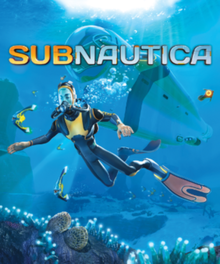Subnautica is an action-adventure survival game developed and published by Unknown Worlds Entertainment. The player controls Ryley Robinson, the only survivor of a spaceship crash on an alien oceanic planet, which they are free to explore. The main objectives are to find essential resources, survive the local flora and fauna, and find a way to escape the planet.
| Subnautica | |
|---|---|
 Cover art | |
| Developer(s) | Unknown Worlds Entertainment[a] |
| Publisher(s) | Unknown Worlds Entertainment[b] |
| Director(s) | Charlie Cleveland |
| Producer(s) | Hugh Jeremy |
| Designer(s) | Charlie Cleveland |
| Programmer(s) |
|
| Artist(s) |
|
| Writer(s) | Tom Jubert |
| Composer(s) | Simon Chylinski |
| Engine | Unity |
| Platform(s) | |
| Release |
|
| Genre(s) | Action-adventure, survival |
| Mode(s) | Single-player |
Subnautica was released in early access for Windows in December 2014, macOS in June 2015, and Xbox One in May 2016. The game was released out of early access in January 2018 for macOS and Windows, with versions for PlayStation 4 and Xbox One in December 2018. The physical console versions were published by Gearbox Publishing. The Nintendo Switch, PlayStation 5, and Xbox Series X/S versions were released in May 2021. It received generally positive reviews from critics and sold over 5 million units by January 2020. A sequel, Subnautica: Below Zero, was released in May 2021. A third installment, Subnautica 2, is planned to release in early access sometime in 2025.
Gameplay
Subnautica is a survival Action-adventure game set in an open world environment and played from a first-person perspective. The player controls the lone survivor of the crashed spacecraft known as Aurora, Ryley Robinson, as he is stranded on a remote ocean planet known as 4546B in the Andromeda Galaxy.
The main objective is to explore the ocean and survive its dangers, while completing tasks to advance the plot. Players can collect resources and blueprints, construct tools, build bases and submersibles, and interact with the planet's wildlife.[1][2][3]
The majority of the game is set underwater, with two explorable islands, and a simulated day-and-night cycle that affects visibility, along with an eclipse that happens on rare occasion. Upon beginning a new game, players are given an option between four difficulty modes:
- In survival mode, the player manages their depleting health, hunger, thirst and oxygen. If the player dies, they respawn, but certain items are removed from their inventory.
- In freedom mode, gameplay is near-identical to that of survival mode, but without hunger and thirst.
- In hardcore mode, gameplay includes permanent death. If the player dies, they do not respawn, and their save file is instead permanently deleted. Additionally, the player does not receive warnings of low oxygen levels as they would in other modes.
- In creative mode, all depleting characteristics, such as health and thirst, are removed, all blueprints are unlocked, and the player can craft without needing resources. Additionally, the submersibles, a stasis rifle, a Seaglide, a mobile vehicle bay, and a propulsion cannon are provided, which do not need an energy source to operate, and are immune to crush depth.
The game supports VR headsets, such as the HTC Vive and the Oculus Rift, with the additional input of a keyboard and mouse or game controller.[4]
Plot
Approximately 1000 years prior to the game's events, the Precursors, an ancient, advanced alien species, came to 4546B in search of a cure for an apocalyptically deadly disease (the "Kharaa Bacterium"). Investigating thousands of planets in an attempt to find a cure, the Precursors eventually located a species of organism on 4546B, the Sea Emperor Leviathan, which produced an enzyme ("Enzyme 42") that could cure Kharaa. Unfortunately, the only living Sea Emperor was too elderly to produce the enzyme in enough potency to develop a cure. Although the Precursors attempted to force the Sea Emperor's eggs to hatch, hoping to acquire a more potent form of Enzyme 42 from her offspring, they were unsuccessful. In an attempt to better understand the egg-hatching process of the Sea Emperor, the Precursors took the egg of a Sea Dragon Leviathan (an evolutionary cousin of the Sea Emperor) to study. The Sea Dragon whose egg they took tracked down where the eggs were being held and rammed into their lab, destroying it and allowing the Kharaa bacterium, into the planet's ecosystem. The Precursors enabled a facility known as the Quarantine Enforcement Platform, a large weapon that fires on any spacecraft attempting to land on, or leave, 4546B, before evacuating. Kharaa was prevented from wiping out life on 4546B by a small amount of Enzyme 42 that was spread around (unintentionally) by a vent system the Precursors had built which connected the open ocean to the Sea Emperor's containment chamber.
Much later, 10 years before the events of the game, a private vessel, the Degasi, came too close to 4546B and was shot down. Three of its crew members -- the captain, a mercenary named Marguerit Maida, and the captain's son -- ejected in a life pod. After weeks of drifting they washed ashore on the Floating Island, an island (visitable in-game) held up by enormous buoyant creatures permanently stuck to its underside. The Degasi survivors constructed a base on the island and began growing food. Eventually, a small alien artifact washed up on the shore and was discovered by the mercenary. Tensions built as Marguerit insisted they leave the island and move into the ocean, citing the waning food supplies, lack of resources on the island, and desire for discerning the origin of the alien artifact as justifications for doing so. The captain, though initially wanting to stay on the island and await rescue, caved after rain flooded their growbeds and a landslide partially crushed their habitat. They built a base in an underwater cave system (the "Jellyshroom Caves"). Some time during their stay in the Jellyshroom Caves, the captain's son picked up a mysterious energy signature on a scanner. Once again, the captain and his son reluctantly agreed to Marguerit's suggestions to move to an even deeper location in search of answers. At their new base in the "Grand Reef" biome, the captain's son learned of the Kharaa Bacterium's existence and concluded that every animal on the planet, including themselves, was infected with it. The captain's son set out to find a cure to the infection, attempting to figure out how the fish remain immune to the disease. During his research efforts, Marguerit attacked a predatory Reaper Leviathan and towed it back to the base using a submarine. Shortly afterwards, the base was attacked by a second Reaper Leviathan, resulting in the death of the captain. The captain's son, believing Marguerit to be dead, returned to the Floating Island and built a small observatory atop one of the island's mountains before succumbing to the Kharaa infection and dying. Marguerit survived her struggle against the Reaper Leviathan, killing it and using it as a makeshift raft. She floated to the planet's polar region and appears again in Subnautica: Below Zero.
10 years later, the Aurora, brand-new flagship of the Alterra Corporation, draws too close to 4546B while scanning for the remains of the Degasi and is shot down. 8 hours after the crash, Aurora receives a blueprint for an escape rocket from Alterra HQ, just before the long-range receiver goes offline. Many crew members eject in life pods, though only one survives: the player-character, Ryley Robinson, who is infected with Kharaa shortly after landing. After repairing his life pod's radio and secondary systems, Ryley begins receiving radio transmissions leading him to the other (now-empty) life pods. After some time has passed, Ryley begins receiving transmissions from the Andromedan trading vessel Sunbeam. After detecting the debris field in orbit around, and on the surface of, 4546B, Sunbeam comes to rescue Ryley. Sunbeam is shot down by the Quarantine Enforcement Platform while landing, exploding mid-air and leaving no survivors. After this, Ryley receives a final transmission from Alterra HQ, informing him of the escape rocket blueprint in the captain quarters aboard Aurora and providing him with the access code for the room. Ryley also begins receiving telepathic communications from the Sea Emperor Leviathan in the Primary Containment Facility. The Sea Emperor helps Ryley find its containment facility, briefly explaining her history with the Precursors and asking Ryley to activate the teleporter within her containment chamber and hatch her eggs so that her young may be free. She gives Ryley the recipe for an enzyme that will allow her eggs to hatch. After the eggs hatch, the juvenile Sea Emperor Leviathans spit out a concentrated form of Enzyme 42 which cures Ryley's infection as well as all the other infected fish on 4546B, finally eradicating the disease. Now cured, Ryley is able to disable the Quarantine Enforcement Platform (it can only be disabled by a person who is not infected with Kharaa), build the escape rocket, and leave the planet.
After the credits finish rolling, an automated voice can be heard informing Ryley that he is one trillion credits in debt to Alterra, and will only be granted permission to land once he has paid it off.
Development
Subnautica was announced by Unknown Worlds Entertainment on December 17, 2013,[1] with Charlie Cleveland as the director and lead gameplay programmer, and Hugh Jeremy as the producer.[5] The music is composed by Simon Chylinski.[6]
Cleveland was heavily inspired by Minecraft, which he noted "transformed the game industry" and "threw away all traditional challenge oriented and progression oriented games". The release of Minecraft overlapped with Unknown Worlds releasing Natural Selection 2. Feeling exhausted, the team wanted to try something new and decided to make such a game.[7] Other influences included scuba diving, the filmography of James Cameron, and "just the feeling of exploring the deep, dark, alternately beautiful and terrible, ocean depths. Feeling like I’m an explorer, almost an astronaut, not knowing what I’ll find".[8] Cleveland did not initially view it as a survival game but as an exploration game.[8]
The development team opted to use the Unity engine rather than Spark, the engine used for the company's previous game, Natural Selection 2. Subnautica producer Hugh Jeremy justified this decision because of the different demands that the game places on the engine, and "because [the team] does not include people working on Spark, it's not appropriate for Subnautica to use Spark. By using Unity for Subnautica, Spark can continue to develop in certain directions, while Subnautica develops in others. To use Spark for Subnautica would be like trying to fit a square peg in a round hole."[9]
The game lacks the traditional mission or quest structure usually found in video games. This was a deliberate choice; Cleveland stated "with intrinsic rewards, people are instead encouraged to just do the activities for their own merit, less people would be motivated to do it. But, if they did get over that learning period they would get to the point where they internalized that activity as pleasurable on its own and they would continue".[10] Cleveland opted for this after reading an essay by Jamie Cheng who implemented similar philosophies into his game Don't Starve.[10]
Early access versions of Subnautica were released on Steam Early Access on December 16, 2014[11] and on Xbox One Preview on May 17, 2016.[12][13][14] During this initial release the game featured no hunger or thirst mechanics. After receiving criticism, specifically from one player whose critique "struck home for me", the team opted to include such a system eventually discovering that it helped players orient themselves to the early parts of the game.[8] The full version of the game was released on January 23, 2018, for macOS and Windows personal computers,[15][16] and on December 4, 2018, for PlayStation 4 and Xbox One consoles.[17] The Nintendo Switch, PlayStation 5 and Xbox Series X/S versions of the game and a sequel, called Subnautica: Below Zero, were released on May 14, 2021.[18][19][20][21] Previously, Below Zero was released in early access on January 30, 2019.[22][23][24]
Reception
| Aggregator | Score |
|---|---|
| Metacritic | (PC) 87/100[25] (PS4) 80/100[26] (XONE) 81/100[27] |
| Publication | Score |
|---|---|
| Destructoid | 9.5/10[29] |
| Game Informer | 8.75/10[33] |
| GameSpot | 9/10[31] |
| GamesRadar+ |      [28] [28] |
| IGN | 9.1/10[30] |
| Nintendo Life | 9/10[34] |
| Nintendo World Report | 8/10[35] |
| PlayStation Official Magazine – UK | 8/10 |
| Official Xbox Magazine (UK) | 8/10 |
| PC Gamer (US) | 89/100[32] |
Subnautica received positive pre-release reception. Ian Birnbaum of PC Gamer described Subnautica as an "underwater Minecraft", remarking that "with an experienced developer at the helm and a limitless variety of the oceans to play with, it's going to take a lot for Subnautica to go badly wrong. As the toolbox gets deeper and the shape of the end-game gets set, Subnautica will be a unique example of the ways survival can be tense, rewarding, and fun."[2] Marsh Davies of Rock, Paper, Shotgun praised the rewarding nature of exploring the world of Subnautica, but criticized the "arbitrariness" and lack of intuition in some of the in-game recipes.[36]
At launch, the game received "generally positive reviews" on all platforms according to review aggregator Metacritic.[25][26][27]
By January 2020, more than 5.23 million copies had been sold across all platforms, excluding free copies given as part of promotions.[37]
Accolades
| Year | Award | Category | Result | Ref. |
|---|---|---|---|---|
| 2018 | Golden Joystick Awards | Best Visual Design | Nominated | [38][39][40] |
| Best Audio Design | Nominated | |||
| Breakthrough Award (Unknown Worlds) | Won | |||
| PC Game of the Year | Won | |||
| Ultimate Game of the Year | Nominated | |||
| Gamers' Choice Awards | Fan Favorite Indie Game | Won | [41] | |
| 2019 | 22nd Annual D.I.C.E. Awards | Outstanding Achievement in Game Design | Nominated | [42] |
| National Academy of Video Game Trade Reviewers Awards | Game of the Year | Nominated | [43] | |
| Sound Effects | Nominated | |||
| 15th British Academy Games Awards | Original Property | Nominated | [44] |
See also
Notes
References
External links


